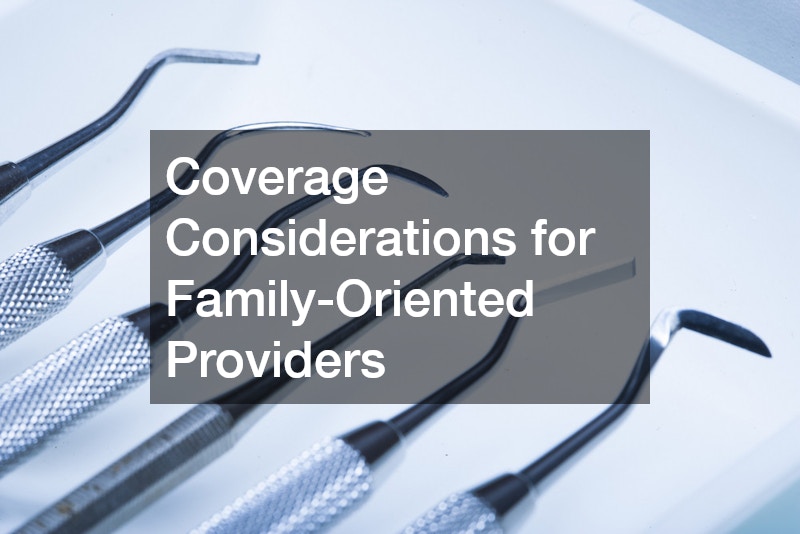Starting and maintaining a successful healthcare practice requires more than medical expertise and excellent patient care—it demands strategic planning, especially when it comes to insurance. As a practicing professional, you face a variety of risks that can threaten your reputation, financial stability, and your ability to continue delivering care. Whether you run a small clinic, manage a dental office, or operate a specialized spa, having comprehensive insurance coverage tailored to your needs is crucial. From malpractice claims to property damage and data breaches, healthcare providers must be prepared for anything. This guide explores the insurance essentials for protecting your practice and safeguarding your livelihood.
Let’s explore how specific types of healthcare providers—from dentists to sleep doctors—can benefit from insurance policies designed with their unique services in mind.
Addressing the Risks of Dental Practices
For a dentist, insurance coverage is not optional—it’s foundational. Dental professionals operate in environments with high patient turnover, equipment-heavy setups, and hands-on procedures that carry risk. Malpractice insurance is a must to protect against claims of negligence, but other types like property, general liability, and cyber insurance are also critical. Even a small infection post-procedure could escalate into a legal battle that threatens the practice. A practicing professional in dentistry should also consider business interruption insurance, which can cover income loss due to unforeseen closures. The potential for equipment breakdown or natural disaster could otherwise lead to devastating financial consequences. Moreover, coverage for data breaches has become increasingly important, as most dental offices now handle sensitive information electronically. Ensuring that both patient records and digital infrastructure are protected is not just good practice—it’s a necessity. By understanding the risks inherent to their line of work, dentists can select insurance policies that provide adequate protection and peace of mind.
Coverage Considerations for Family-Oriented Providers

A family dentist sees patients across age ranges, from toddlers to seniors, and often builds long-term relationships with multiple generations of the same family. This broad patient base introduces unique challenges when it comes to liability and patient expectations. A practicing professional in family dentistry needs to carry professional liability insurance to defend against claims of misdiagnosis, delayed treatment, or procedural errors. In addition, family practices are typically bustling environments, making general liability coverage important to guard against accidents like slips and falls. Another layer to consider is employment practices liability insurance, which helps defend the practice if faced with lawsuits from employees concerning wrongful termination or discrimination. Family dentists often rely on word-of-mouth and community reputation, meaning a single legal incident can impact future patient trust. Insurance not only protects financially but also demonstrates professionalism and preparedness—qualities every patient looks for when entrusting a provider with their family’s oral health.
Navigating Liability for Orthodontic Services
Offering Invisalign and other orthodontic services presents both opportunities and risks. While the appeal of clear aligners has grown due to their convenience and aesthetics, they also come with potential complications that can result in dissatisfied patients or even lawsuits. A practicing professional who provides Invisalign must secure strong malpractice coverage to account for errors in treatment planning, delayed outcomes, or complications. Since patients often invest thousands in treatment and expect perfect results, it’s not uncommon for them to seek legal action if outcomes don’t meet expectations. Property insurance is also key, as orthodontic practices rely heavily on specific equipment that can be costly to replace. Furthermore, if the provider uses 3D imaging or digital scans, cyber insurance becomes crucial to protect the patient data associated with each case. Even marketing strategies for services like Invisalign need to be carefully managed to avoid misrepresentation—another area where liability insurance could help shield the provider from disputes.
Insurance Tips for Cosmetic-Focused Offices

Operating a cosmetic dental office means working in an elective field where patient satisfaction is deeply personal and subjective. From teeth whitening to veneers, these services are expected to deliver aesthetic transformations. That expectation heightens the liability risks. If a patient claims the results didn’t meet expectations or caused discomfort, the consequences could range from refund demands to lawsuits. For the practicing professional in cosmetic dentistry, malpractice insurance tailored to elective procedures is essential. It’s also wise to maintain clear consent forms and before-and-after documentation as part of a strong risk management strategy. Cosmetic offices also often have upscale environments and costly decor, which makes property insurance especially important. In addition, offering luxury experiences and handling high-spending clients increases exposure to potential legal disputes, making legal expense insurance a smart addition. These specialized services attract more scrutiny, and the best protection is a comprehensive insurance portfolio that anticipates every angle of risk.
Ensuring Stability in Surgical-Based Practices
Dental implants are among the most advanced—and risky—procedures offered in a dental setting. The complexity of implant placement, combined with the permanence of the results, increases both the medical and legal risks for the provider. A practicing professional performing these procedures must carry malpractice insurance that specifically covers surgical risks, infections, implant failures, and nerve damage. These procedures often involve sedation or anesthesia, which adds another layer of risk that should be acknowledged in the policy. Furthermore, if the office operates its lab for producing implant components, product liability insurance may also be necessary. Unlike routine dental work, implants are often cash-pay procedures, so financial disputes can become personal and contentious. Robust insurance helps protect against losses stemming from both procedure-related injuries and dissatisfied patients. Additional coverage, like workers’ compensation, is also important, especially in a setting where staff assist with complex surgeries and may face occupational hazards such as needle sticks or repetitive strain injuries.
Importance of Comprehensive Coverage for General Practices
General dental care services form the backbone of most dental practices, providing cleanings, exams, x-rays, and preventative care. While these services may seem routine, they are not without risk. Even a basic cleaning can cause gum irritation, and failure to detect early signs of oral diseases can result in significant liability. For the practicing professional delivering these services, professional liability insurance is non-negotiable. It’s also vital to carry general liability insurance, especially given the daily foot traffic in waiting rooms and patient areas. If a patient slips on a wet floor or trips on loose carpeting, the practice could be sued. Equipment insurance is another important coverage area, as even temporary loss of x-ray or sanitation tools can disrupt care. For practices that are digital-forward, cyber liability is also critical to protect electronic health records. Insurance for dental care services needs to be as comprehensive as the care provided, covering the full spectrum of patient interactions and operational concerns.
Protecting Specialists in Sleep Medicine

Sleep doctor offices deal with sensitive and sometimes life-altering diagnoses such as sleep apnea, narcolepsy, and insomnia. Misdiagnoses or delays in treatment can lead to severe health consequences, increasing the risk of malpractice claims. A practicing professional in this field should carry high-quality malpractice insurance that accounts for both clinical errors and equipment issues, particularly related to devices like CPAP machines. Many sleep clinics also conduct overnight sleep studies, which opens the door to premises liability issues if patients are injured during their stay. Additionally, property insurance should be included to cover specialized monitoring equipment and electronics. Since these offices often work closely with other providers such as ENT specialists or cardiologists, liability can be complex and overlapping—another reason to invest in comprehensive coverage. Cyber insurance is also crucial due to the high volume of sensitive patient data collected and transmitted. A well-protected sleep clinic is not only better positioned to serve patients safely but is also prepared to withstand unexpected legal or operational challenges.
Securing Wellness and Treatment Centers
A weight loss clinic must navigate an especially delicate balance between promoting health and managing expectations. Treatments often involve dietary counseling, prescriptions, and sometimes medically supervised procedures like lipotropic injections. All of these carry risk. A professional working in this environment needs medical malpractice insurance that covers these interventions. Additionally, because weight loss can affect mental and emotional health, there’s also potential exposure to lawsuits involving psychological claims or unrealistic expectations. These clinics often operate under physician supervision, which may require a more complex group policy that includes all licensed providers. General liability and property insurance are also important, especially in facilities that include fitness areas, cooking demonstrations, or injection services. Any facility offering supplements or retail items should also consider product liability insurance. Moreover, employment practices liability can be essential in a field where appearance-based services may lead to workplace claims around discrimination or harassment. Insurance helps these centers stay focused on results without being vulnerable to litigious outcomes.
Mitigating Risks in Aesthetic Practices

A medical spa bridges the gap between health care and beauty, often providing treatments such as Botox, laser therapy, and chemical peels. These procedures, while non-surgical, still carry risks including burns, allergic reactions, or uneven results. A practicing professional working in a medical spa must secure medical malpractice insurance specific to aesthetic medicine. In addition to general liability, the spa should have product liability coverage to protect against reactions to products used during services. Since med spas frequently operate in high-end locations and serve affluent clientele, they face heightened reputational risk, meaning that public liability and crisis management coverage can also be valuable. Equipment insurance is essential for costly laser machines or skin analysis devices, and cyber insurance is critical if the spa uses digital before-and-after records or online appointment systems. Having strong coverage not only protects the spa but also builds client confidence. Patients want to know their provider is professional, skilled, and fully protected in case something doesn’t go as planned.
Coverage Essentials for Pain Management Practices
Clinics that offer back pain treatment are often high-risk environments. They may provide physical therapy, chiropractic services, pain medication management, or even minor surgical procedures like spinal injections. Any of these can lead to complications that trigger malpractice claims. A professional in pain management must carry robust professional liability insurance that accounts for the various treatment modalities offered. Given the chronic nature of back pain, many patients have long-term relationships with these clinics, so strong documentation and consent protocols are essential to reduce risk. Equipment insurance is also necessary for devices like traction tables, TENS units, or spinal decompression machines. General liability is critical to address any patient injuries occurring on-site, and workers’ compensation insurance should be secured to protect staff, who may also face physical strain assisting with therapies. These practices often also provide telehealth services, which introduces the need for cyber liability insurance. In this high-stakes environment, comprehensive coverage is not just a safety net—it’s a prerequisite for long-term success.
Creating a Culture of Protection in Healthcare
Insurance is not merely a business requirement—it’s an essential tool in a practicing professional’s arsenal. Whether you’re running a cosmetic office or managing a sleep clinic, the goal remains the same: to protect the practice, the provider, and the patients. The right combination of coverage types can make the difference between bouncing back from a mishap and facing financial ruin. In today’s increasingly complex medical landscape, where legal claims and cyber threats are ever-present, insurance must be seen as a proactive investment rather than a reactive cost. Each healthcare setting—from the smallest dental suite to the largest multidisciplinary clinic—needs customized coverage that reflects its specific services and patient demographics. Ultimately, being a well-insured practicing professional translates to a more secure, respected, and resilient healthcare business.
The life of a practicing professional in the healthcare field is filled with unpredictability. From human error to technology failure and legal exposure, threats can arise at any time. Yet, with the right insurance policies in place, these risks can be managed effectively. As healthcare services become more diversified, insurance strategies must also evolve. Providers must evaluate their operations regularly, consult with insurance experts, and adapt their coverage to match new services, equipment, and personnel. It’s not enough to buy a policy and forget about it—maintaining coverage is an ongoing responsibility that ensures the continued success and security of your practice. Whether you’re treating cavities, facilitating weight loss, or easing chronic pain, your patients rely on you to deliver care with confidence. Protecting your practice is more than a legal obligation—it’s a professional duty. And for the practice, it’s the cornerstone of a future that is as stable as it is compassionate.
